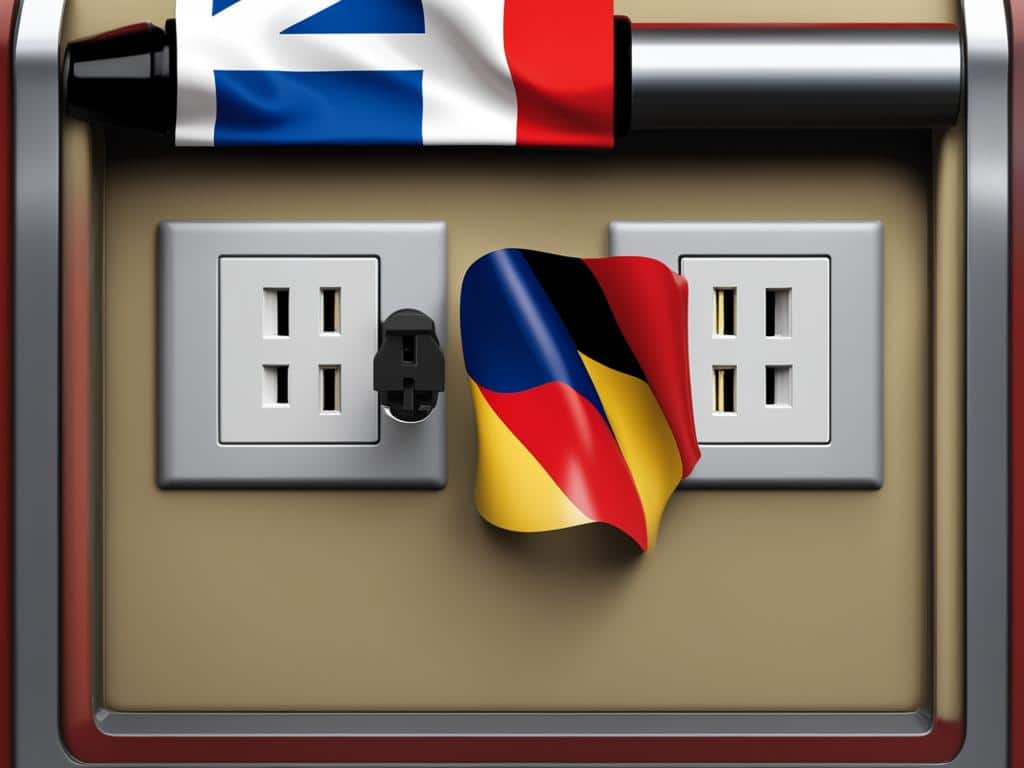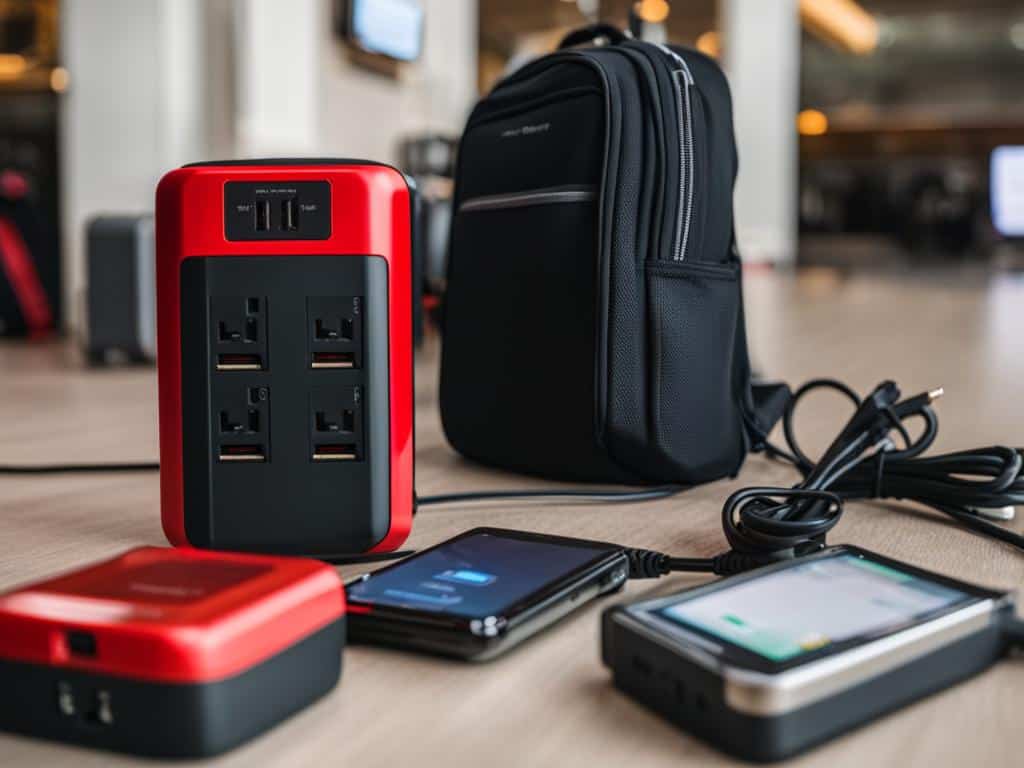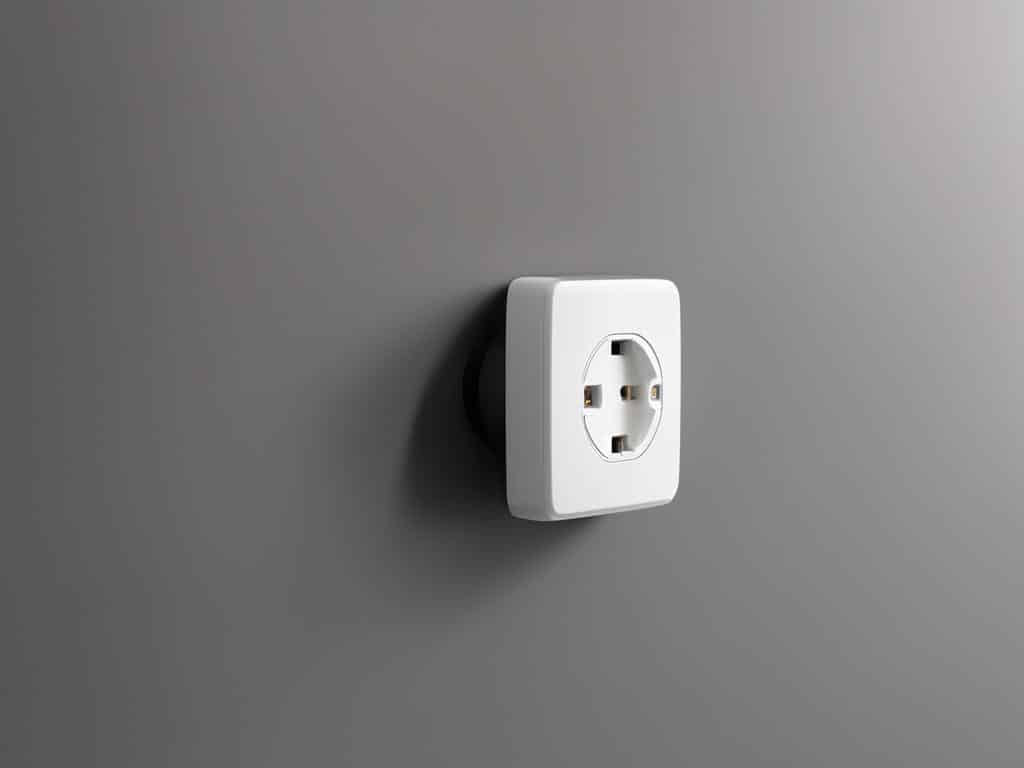For wanderlust enthusiasts gearing up for an adventure in Germany, ensuring you have the right gadgets is as important as your itinerary.
It’s important to get the right outlet adapter Germany has. Amidst all your travel essentials, don’t forget the indispensable international plug adapter.
Whether you’re capturing memories on your camera or navigating through cobbled streets with your smartphone, the electrical compatibility of your devices is crucial. Germany’s unique plug sockets mean your American chargers might not fit without the right adapter or voltage converter.
Understanding the differences between these gadgets is key for anyone traveling to Germany, ensuring all tech stays powered up from touchdown to takeoff.
Key Takeaways
- Double-check your tech: some devices might need a voltage converter in addition to a plug adapter.
- Learn the difference between international plug adapters and voltage converters for a smooth travel experience.
- In Germany, expect to encounter plug types F and C: these are distinct from the US standard.
- Rechargeable electronics often support dual voltages making them travel-friendly across various destinations.
- Pre-purchase travel adaptors or voltage converters to avoid inconvenience upon your arrival in Germany.
- The right adapter is essential for keeping devices charged and functional throughout your German escapade.
Understanding Germany’s Electrical System
When preparing for a trip to Germany, one of the key considerations is understanding the electrical system to ensure all your devices function seamlessly throughout your stay.
A grasp of the standard voltage and power outlets can save you from the inconvenience of unusable gadgets when you’re far from home, and make sure you buy the right outlet adapter Germany needs to run for your devices.
The Standard Voltage and Frequency in Germany
The electricity supply in Germany operates at a standard voltage of 230V and a frequency of 50Hz.
This is a notable difference from the USA, where the standard voltage is 120V with a frequency of 60Hz. The discrepancy implies that any single voltage appliance from the US will require a Voltage converter for Germany to function properly.
Distinguishing Between Plug Type C and Type F
Focusing specifically on the electrical socket in Germany, travelers need to be aware of the two principal plug types: type C and type F. Type C, also recognized as the European plug, embodies two round pins. Type F, also referred to as “Schuko,” includes two round pins accompanied by two ground clips. They differ significantly from the US types A and B – which are flat-pinned.
Therefore, to connect devices from the US, a European plug adapter is vital.
It is encouraging, on the other hand, that most modern rechargeable electronics are equipped with dual-voltage capability.
This means such devices are labeled with “100-240V, 50/60Hz” and are universal, requiring only a plug adapter – a simpler solution compared to a voltage converter. However, it is always prudent to check your device’s specifications before relying on a German power outlet.
- American devices need a power adapter for Germany due to differing outlet types.
- The standard socket in Germany is type F, necessitating a European plug adapter.
- Type F sockets are prevalent in Europe, making your German adapter largely versatile across the continent.
- Remember: the UK and Ireland will require a different type of plug adapter entirely.
For a practical illustration, consider this straightforward comparison:
| Plug Type | Description | Compatible with German Socket? |
|---|---|---|
| Type A | Two flat parallel pins | No |
| Type B | Two flat parallel pins with a grounding pin | No |
| Type F | Two round pins with two earth clips | Yes |
Embarking on a journey to Germany requires a bit of electrical foresight. Grabbing the right power adapter for Germany will enable you to capture every moment without fearing a dead battery.
Make sure your travel checklist includes a quality European plug adapter, and you’ll be all set to go!
Choosing the Right Voltage Converter for Your Devices
Embarking on a journey to Germany necessitates a keen understanding of your travel adaptors and converters.
While Germany offers a plethora of cultural and historical experiences, the country’s electrical system requires special attention from U.S. travelers aiming to use their electronic devices.
Why Voltage Converters are Essential for Some Electronics
For those planning to bring American electronic appliances to Germany, the stark difference in voltage outputs between the two countries is a red flag for potential gadget mishaps.
With Germany’s standard output of 230V, a voltage converter for Germany becomes an essential accessory for single-voltage U.S. devices designed for 110V. Without it, you risk not only the functionality but also the safety of your cherished devices.
Let’s address the quintessential question: what is the need for a voltage converter? The purpose is straightforward — it modifies the electrical output from German outlets to match the voltage requirement of your U.S. devices.
This critical adjustment allows you to use your gadgets just as you would at home – efficiently and safely.
Single Voltage vs Dual Voltage Appliances
The distinction between single voltage and dual voltage appliances significantly impacts your travel adapter needs. Certain devices, especially high-powered items like hairdryers or portable kitchen gadgets, are single voltage and may require separate voltage converters.
In contrast, many modern electronics, such as smartphones, laptops, and tablets, boast a dual voltage specification, indicating their capacity to operate within a broad voltage range (100-240V).
Here’s where it gets easier: If your device is dual voltage, as indicated by an input label of “100-240V, 50/60Hz”, you need not worry about a voltage converter. For such Germany travel essentials, a simple travel adapter will suffice – a less cumbersome solution facilitating your travels and connectivity.
Before you zip up your suitcase, take a moment to scrutinize each device for its voltage rating.
The key to an untroubled travel experience with your electronics lies in this crucial step.
For those devices that do not support dual voltages, consider a combined plug adapter and voltage converter for a more streamlined travel experience.
It’s a nifty solution that caters both to your power needs and the diverse range of sockets you might encounter across Europe, not just in Germany.
| Device Type | Voltage Rating | Requires Voltage Converter? |
|---|---|---|
| Dual Voltage Appliances (Smartphones, laptops, etc.) | 100-240V | No |
| Single Voltage Appliances (Certain hairdryers, etc.) | 110V | Yes |
| Universal Travel Adapter | Compatible with most voltages | Depends on the device |
Ensuring you have the appropriate travel adapter or voltage converter for Germany paves the way for a seamless experience, keeping your devices powered and ready for adventure. Be sure to check and double-check your electrical items well in advance of your trip – it’s better to be safe than sorry when it comes to safeguarding your electric companions abroad.
Germany Travel Essentials: Adapters and Converters
Traveling to Germany calls for a bit more than just packing your bags and jetting off. It involves preparing for all the practicalities, too. A key aspect of this preparation is ensuring you have the necessary power adapter for Germany and, possibly, a voltage converter. Functionality and safety of your devices depend on it!
To plug into the German power outlets, you’ll mainly encounter type F sockets, which differ from the ones in the USA. This is where the international plug adapter becomes a travel essential. Renowned options like the Ceptics European Plug Adapter Set are designed to be compatible with these outlets, giving your devices the perfect gateway to German electricity.
However, an adapter might not be the end-all solution for all your devices. Appliances surpassing Germany’s 230V standard will demand a voltage converter for Germany to prevent damage. Such converters are vital for single voltage devices, ensuring they match Germany’s electrical output.
Nowadays, travel adapters and voltage converters are readily available from online retailers like Amazon, providing a hassle-free purchase before jetting off. Beyond the basic adapters, incorporating some optional tech items could also vastly enhance your traveling to Germany experience.
- A portable phone charger is a must-have for long days of exploration, ensuring you’re always just a USB port away from a battery boost.
- If you’re an Apple aficionado, a European plug for MacBook can streamline your connection – no adapter needed.
- Lastly, don’t underestimate the utility of a power strip; it’s a lifesaver for tech-savvy travelers with multiple devices.
Simple adapter solutions often serve well, but it’s imperative to review each device’s requirements. Should you need it, a combination of a plug adapter and voltage converter will have you prepared for any electronic eventuality in Germany.
| Gadget Type | Adapter or Converter Needed | Recommended Product |
|---|---|---|
| Smartphones/Tablets (Dual Voltage) | Plug Adapter Only | Ceptics European Plug Adapter Set |
| Single Voltage items (e.g., Hairdryers) | Plug Adapter and Voltage Converter | Unidapt Universal Converter |
| MacBook (Apple Devices) | Specialized European Plug | Apple World Travel Adapter Kit |
Arming yourself with these travel essentials not only ensures that you’re ready to capture every moment and navigate every challenge in Germany but also protects the longevity and safety of your favorite devices. With the right international plug adapter and a suitable voltage converter, you’re all set to immerse in the allure of Germany!
Pre-Travel Checklist for Electrical Devices
Before leaving for Germany, conduct a thorough check of all the devices you plan to bring. For each item, determine whether it is dual voltage or single voltage. If it’s the latter, purchase a reliable voltage converter for Germany to match the country’s 230V power standard. For those tech items displaying ‘INPUT: 100-240V, 50/60 Hz,’ rest easy knowing a simple power adapter for Germany will suffice for their operation. Acquiring these adapters and converters prior to departure not only gives peace of mind but also saves you from the last-minute scramble upon landing.
Tips for a Hassle-Free Experience with Electronics in Germany
Staying powered up in Germany is seamless when you have all the right tools at your disposal. Remember that your trip will be smoother if you’re prepared with both a plug adapter and, when required, a voltage converter. Not only will this foresight allow you to use your devices upon arrival, but it will also prevent potential damage to your electronic companions. Keep them charged and fully functional so that your time spent exploring, photographing, and indulging in Germany’s rich culture remains uninterrupted and thoroughly enjoyable.
FAQ
What do I need to know before traveling to Germany regarding power adapters?
When traveling to Germany, it’s crucial to know that the country uses plug types F and C. You’ll need an international plug adapter if your devices come with different plugs, such as type A or B commonly used in the United States. Additionally, Germany’s standard voltage is 230V with a frequency of 50Hz, which differs from the 120V, 60Hz standard in the United States.
What is the standard voltage and frequency used in Germany?
Germany operates on a standard voltage of 230V and a frequency of 50Hz. This contrasts with the United States, which uses a standard of 120V and a frequency of 60Hz. Ensure that your electronics are compatible or that you have a voltage converter if necessary.
Can you explain the difference between plug types C and F?
In Germany, plug type C features two round pins and is generally used for devices that do not require a ground connection. Plug type F, also known as Schuko, has two round pins as well, but it also includes two ground clips and is recessed to fit into a circular indentation in the wall socket. Devices that require grounding use this type of plug for enhanced safety.
Do I need a plug adapter for Germany if I’m coming from the United States?
Yes, you will need a power adapter for Germany if your plugs are the American type A or B. German sockets are designed for plug types F and C, so an adapter will allow you to connect your American devices to the German electrical system.
Why are voltage converters essential for some electronics in Germany?
Voltage converters are necessary when you’re bringing single voltage appliances from countries with a lower standard voltage, like the United States. Since Germany uses 230V, using a 110V device without a converter could potentially damage it due to the voltage difference.
What’s the difference between single voltage and dual voltage appliances?
Single voltage appliances are designed to work with only one voltage level, commonly 110V or 120V, as is typical in the U.S. In contrast, dual voltage appliances can operate on a range of voltages, usually between 100V and 240V, allowing them to be used in many countries around the world, including Germany, without the need for a voltage converter.
What are some essential items to bring when traveling to Germany for use with electronics?
For a smooth experience with your electronics while in Germany, ensure you pack a European plug adapter suitable for type F outlets. If you have single voltage devices, you might also need a voltage converter. Items such as portable phone chargers and power strips are also quite handy for managing multiple devices on the go.
How can I ensure a hassle-free experience with my electronics while in Germany?
To ensure your electronics work seamlessly in Germany, check each device’s voltage requirement and whether it’s single or dual voltage. Get the necessary plug adapters and voltage converters beforehand. Additionally, look for labels on your appliances indicating ‘INPUT: 100-240V, 50/60 Hz’ to confirm that you can safely use them without a converter in Germany.


